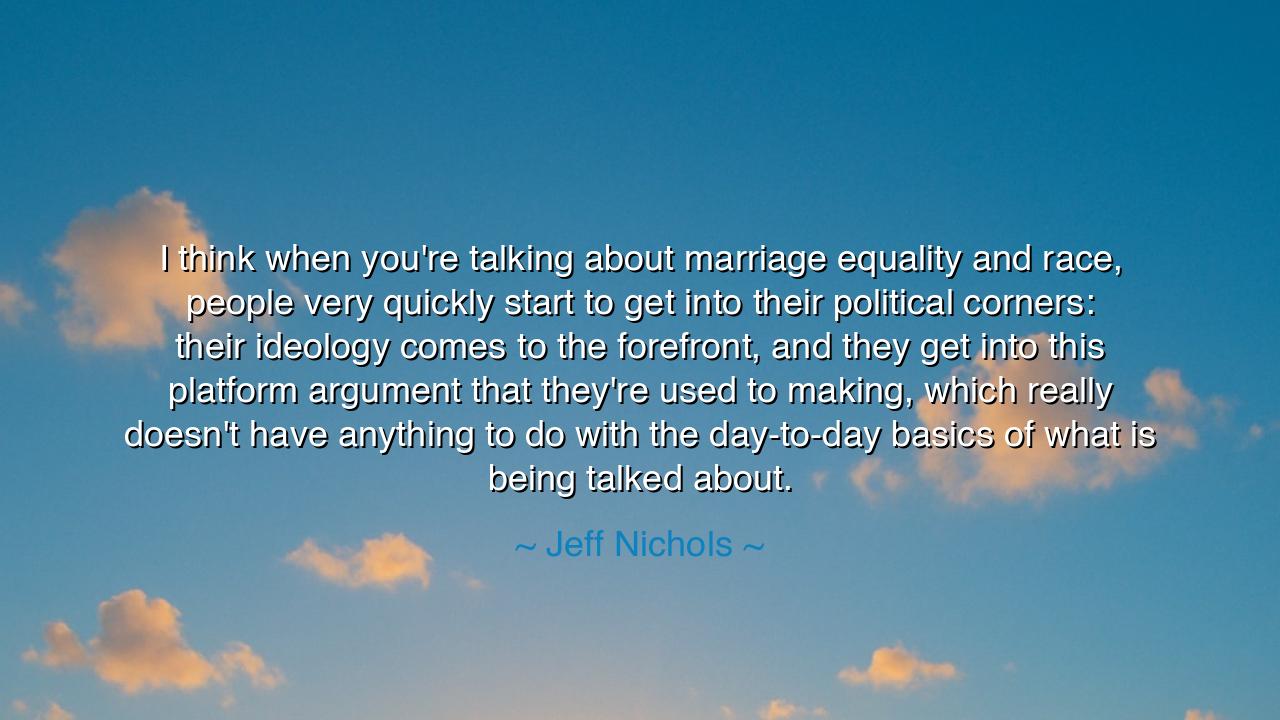
I think when you're talking about marriage equality and race
I think when you're talking about marriage equality and race, people very quickly start to get into their political corners: their ideology comes to the forefront, and they get into this platform argument that they're used to making, which really doesn't have anything to do with the day-to-day basics of what is being talked about.






Hear now, O seekers of understanding, the words of Jeff Nichols, a storyteller of the modern age, who once said: “I think when you're talking about marriage equality and race, people very quickly start to get into their political corners: their ideology comes to the forefront, and they get into this platform argument that they're used to making, which really doesn't have anything to do with the day-to-day basics of what is being talked about.” These are not the words of a politician or philosopher, but of an artist — one who gazes upon the human condition and sees how truth becomes lost when pride takes its place. In this reflection lies a lament as old as civilization: that we build walls of opinion where bridges of understanding were meant to stand.
Nichols speaks as one who has seen how the great moral questions of humanity — the struggles for equality, freedom, and dignity — too often lose their heart when drawn into the arena of political rivalry. He reminds us that debates over marriage equality or race are not merely matters of policy or platform, but of people — flesh and blood, joy and sorrow, love and belonging. Yet when men and women retreat into their ideological corners, they cease to see one another as human beings, and instead see only opponents, caricatures, or abstractions. Thus, compassion withers, and the soul of the conversation is lost.
This wisdom echoes across the centuries. For even in the days of the ancients, when Socrates walked the streets of Athens, he warned of this same blindness — that once people argue not to seek truth but to defend their pride, reason dies. The mind becomes a fortress, and every word a weapon. So too in our age, when the cries for equality and justice rise, they are often drowned out by the noise of parties and platforms. The sacred questions — “What is just? What is humane? What is love?” — are replaced by the empty clang of rehearsed slogans.
Consider, my children, the story of Loving v. Virginia, the case that inspired Nichols’ own film Loving. In that time, the love between Richard and Mildred Loving, a white man and a Black woman, was deemed unlawful in their home state. They were banished from their land for the simple act of being married. Their struggle was not born of political ambition but of the quiet wish to live together in peace. Yet around them raged the great storms of ideology, with lawmakers and judges turning their personal love into a public battlefield. And still, the Lovings remained humble — not warriors, not ideologues, but two souls asking the world to recognize their humanity. In the end, it was their steadfast simplicity that triumphed, not the noise of politics.
Nichols, through his words, calls us to remember this truth: that the “day-to-day basics” — the ordinary lives of those who suffer, love, and persevere — must remain the heart of any discussion on justice. When we forget the people behind the principle, we turn morality into spectacle. The platform argument he condemns is a form of blindness: a comfort in rhetoric that spares us from feeling another’s pain. To speak endlessly of “rights” and “laws” without seeing the faces they affect is to walk through the world with open eyes yet an unseeing heart.
There is a lesson here for all who seek wisdom. When you enter a conversation about equality, race, or justice, guard your soul against the pride of certainty. Listen not to answer, but to understand. Do not recite the lines you have been taught by party or creed; instead, look into the eyes of the one before you and ask, “What does this mean for you?” For truth does not dwell in arguments alone — it dwells in the lived experience of those who bear the weight of injustice.
And so, my friends, the teaching of Jeff Nichols is a call to humility — a reminder that the quest for justice begins not in the halls of power, but in the hearts of the compassionate. Let not ideology divide what empathy was meant to heal. When you find yourself pulled toward the safety of your political corner, step instead toward the center — toward dialogue, toward humanity, toward love. For the measure of our civilization will not be how fiercely we argued, but how deeply we understood.
Thus, remember this truth: to talk about justice without compassion is to speak without soul. If you would honor the causes of equality and human dignity, then speak less as a warrior and more as a witness. Seek not to win the argument, but to heal the wound. And when the noise of the world grows loud, return to the quiet wisdom of the day-to-day basics — the simple, enduring truth that beneath every debate, every law, and every difference, there beats the same heart, longing not for victory, but for understanding.






AAdministratorAdministrator
Welcome, honored guests. Please leave a comment, we will respond soon